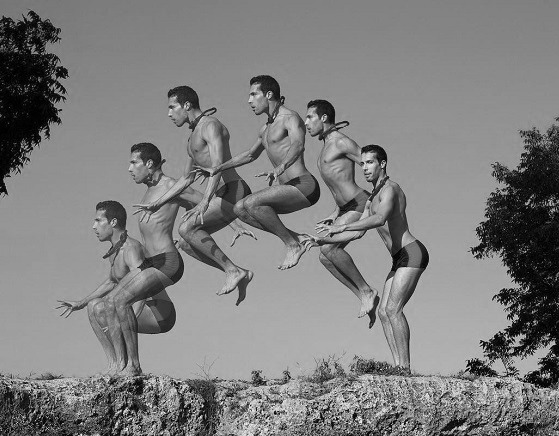See People as Individuals: Escape Identity Politics.

I can see my own tribalism running like atavistic veins through my emotive framework, pumping reactive impulse through me as though I am just a reliquary for my ancestors, for two spirits or collective strata caught in the strainer of my flesh.
Moments can elicit thoughts that are heated with immediacy, a desire to lash out with a rage both mine and belonging to others, lighting me up with borrowed brilliant intensity like the moon, reflecting the fierce light of another.
But these days, I question my readiness to defend, and I will not be provoked into caricatured performance. I will not allow the machinations of others to control or contort my emotional world or my unique human mosaic.
I’m someone who may be more faceted than many in both my own inward awareness of self and in the perceptions of others. The skills I’m trying to improve allow me to appreciate facets without fragmenting; variation within wholeness.
There will be no canny prompts that send me to pieces, that’s the hope at least.
Queer Jewish Person Of Color; a self-assessment that reads from the outside in.
As if the very mechanism with which I use to view my experience was forged in the heat of external impression. Category and discernible attributes caging and supporting me like an exoskeleton, handy if you’d rather be told what you are rather than do the work of investigation yourself.
I do not, though, navigate through my life as an assemblage or easily-parsed-through pieces. I am not a collection of items on a recipe that one can read and know the totality of what I contain with certainty.
My life has been influenced by my attributes, but the perceptual processing of external reality and its interrelationship with my interior life are not shaped by anything that can be instantly named by another.
I am an individual. There is no ideology, critical theory or perspective that can be instantly tallied to discern me or evoked to create a response in me. I feel disheartened by the reductive, simplistic and often manipulative narrative that exists in society now that herds us into isolated chambers of personhood. Claustrophobic and enclosing these vacuums are shaped by the identifiable outlines and disregard the vast personal realms we each contain, which could be used to relate more fully, more deeply with each other.
Sexuality for instance; our conversations invoke a shocking presentism, no ancient civilization organized sexuality as we do. Homosexual desire is witnessed in every society through time, but it is not an organizing principle for community, shared ideology, philosophy or spirituality in any culture but our own. We as modern people myopically assert the role of gay community and culture, and struggle to understand this being anything less than a universally coherent compartmentalization of experiential existence instead of being simply a variation of sexual desire.
It’s seen as something that should bind someone into the constraints of a specific political, personal and cultural viewpoint, affiliating one with the concerns of “The Gay Community” above all things.
Of course, it’s natural to seek out spaces that reflect our interests and desires, but when the arbiters of those spaces presume to dictate what can and cannot be thought, in personal dynamic or in overarching beliefs, then a useful assemblage of loosely affiliated people with some shared goals involving basic expectations of fair treatment becomes a Stalinist holding cell where dissident thoughts aren’t tolerated.
“The Gay Community” has in my perception veered increasingly into solipsistic thought-policing, an intellectually isolationist idea compound that abstains from internal critique, save castigating members who lapse in speech codes.
When does community inhibit one’s essential energetic tone more than protect it?
I think it’s when conformity and an absence in self-reflection are expected.
I have seen writing in “gay publications” become horrifyingly suffocating as thought-policing becomes increasingly accepted.
Dissent is labeled “dangerous”, questions labeled “problematic” may never find solutions, as they’re silenced. This is in my view not progressive, but regressive.
We must be free to discuss ideas readily, we must be able to question the inviolable laws and doctrines of any group, or subjugation and censorship will hold sway. If even a question asked in earnest is seen as violent, then an identity that dominates with tyrannical fragility holds sway and dominates discourse, surely that’s not the progressive dream realized.
In fact, it’s my belief that the brutal silencing to protect a purportedly delicate identity is a familiar tactic of power play. “The Gay Community” risks embodying the very oppression it fought against (when individuals who were attracted to their own sex rose up against religious totalitarianism in the US) mere decades ago.
I’m sure “The Gay Community” serves a purpose, for many people, for many reasons, and I’m certain that it can feel like a bastion of freedom for those who’ve spent parts of their lives concealing parts of themselves. That should not suggest, however, that the only choice is to trade one kind of performative conformity for another, albeit a more innately resonant one.
If sexuality is going to be a foundational element of community for an individual, then one must consider what other equally essential aspects of Self are being ironed out, compressed or disavowed (such a hot word these days) in order to find homogenous union with people who share your same-sex attraction.
What music are we silencing to proudly cry out the name of a love that once dared not speak its own? What creative friction are we sacrificing for smooth uniformity?
I for one will not assume the mode of militant identity-enforcer, the kind that once sought to stamp out homosexual love in the name of a risen god, because the truth is, identity politics have become a god in modern discourse, and it is a jealous god.
Race, like sexuality, seems to have become an all-encompassing demarcation of existence for many. Fortunately, I have many attributes that have been externally policed. It allows me to see each filament shift and shimmer, it allows some variation in perspective, a slight shift in the kaleidoscope allows the borders to dance in shimmying geometric discord.
I see all human interaction as a complex web of shifting matrixes and dynamic relations, each person and collection of people imbued with part of the map of the human landscape.
As a person of color, I have reservations about a one-tone approach to all white/non-white interactions. As a person of mixed European and Native ancestry, I can’t conceive of an easily reducible set of rules favored by the academic hegemony to decipher the myriad interactions that occur in the prism of our mortal lives.
Should we consider power, agency and history when pondering the sociopolitical issues of the day? Of course I believe we must. But, does reactively discounting the perspective of someone based on their ancestry or sex or resonate within me as a sustainable and holistic mode of interaction that will yield egalitarianism? No.
Religion, another interesting form of human variety. In my experience, it required an illuminating shift in awareness to observe how religion informs thought. Imagine if you will seeing a shape in a kaleidoscope shift into two, the gleaming boundaries split, and what was once impenetrable perimeter has now split into a shivering binary, binary itself of course open to interpretive views and shades. The division I describe in my case is Judaism, both as religion and ethnic group.
But like sexuality and race, religion can be used to manipulatively divide and pit us against each other. I’m grateful to contain so many parts of the human story, as it’s easier to see when a script is running on fear of the foreign.
It becomes easy to use one’s upbringing and ancestry to assess that person’s world view, an assumed orientation. Once that’s established, it can be used to coerce. I read in the news recently of a political figurehead conflating the ethno-nationalism of a militant government (Israel) to the deeply personal individual sense of religious/ ethnic affiliation (Judaism).
Why do the talking heads and click-ravening publications think they can wield our very innate qualities against us, that by invoking our (in some cases, literal) tribes we would rail against and dehumanize each other? From my rather multitudinous perspective, it’s because we have allowed it. If we felt more anchored in a wholeness that honored the totality and all its dimensions in another, this would not be so easy.
We have been led by the most base of our survival wiring, to attack that which we deem “other”.
Now that queer people, people of color, and Jewish people have attained the power of speech in modern discourse, we can wield it defensively. Now the hard-won ability to speak gives voice to recrimination to those who would threaten our power and therefore our survival, within our groups and without. Such tribal impulses are given seething immediacy in our internet-accelerated time, which encourage reactivity over staid, thoughtful analyses I’ve observed.
In this fragmented world, as an (obviously, but not diacritically) multifaceted being, I feel that I can only respond with a radical idea: seeing people as individuals. Relating to the essential unique human expression in others even if they do not trigger an instant in-group recognition in me. I am made up of too many pieces to assume uniformity in others. I will not sacrifice my sense of the human experience being a divine learning opportunity, a journey where discovery of Self is made by the exploration of different parts of the psyche.
I can still feel the tribalism running through me like atavistic veins, but I will not let it overcome me with its primitive drumbeat of blind battle.
***

Maren Zweifler enjoys teaching Yoga with a focus on free movement and intrinsic shapes, emphasizing spinal fluidity and innate, primal posture. Deeply inspired by movement systems that embrace nature like Sridaiva and Continuum Movement. He completed a 500 hour certification in SF and has taught both there and in Austin where he honed his skills teaching private classes tailored to the individual needs of his clients. He created a wellness/yoga program at a non-profit. These experiences allowed him to explore both the unique individuation of the physical experience in one-on-one sessions, and the commonalities of the human form that can be witnessed in large groups. You could connect with Maren on Instagram.

